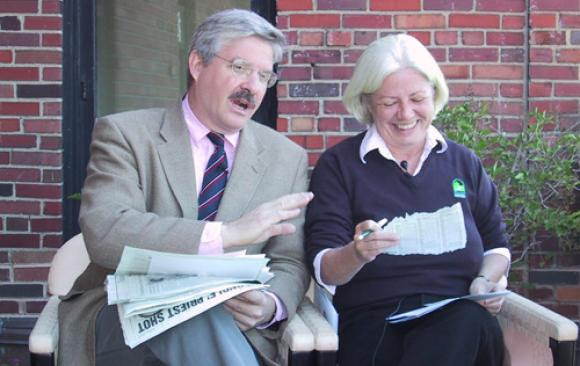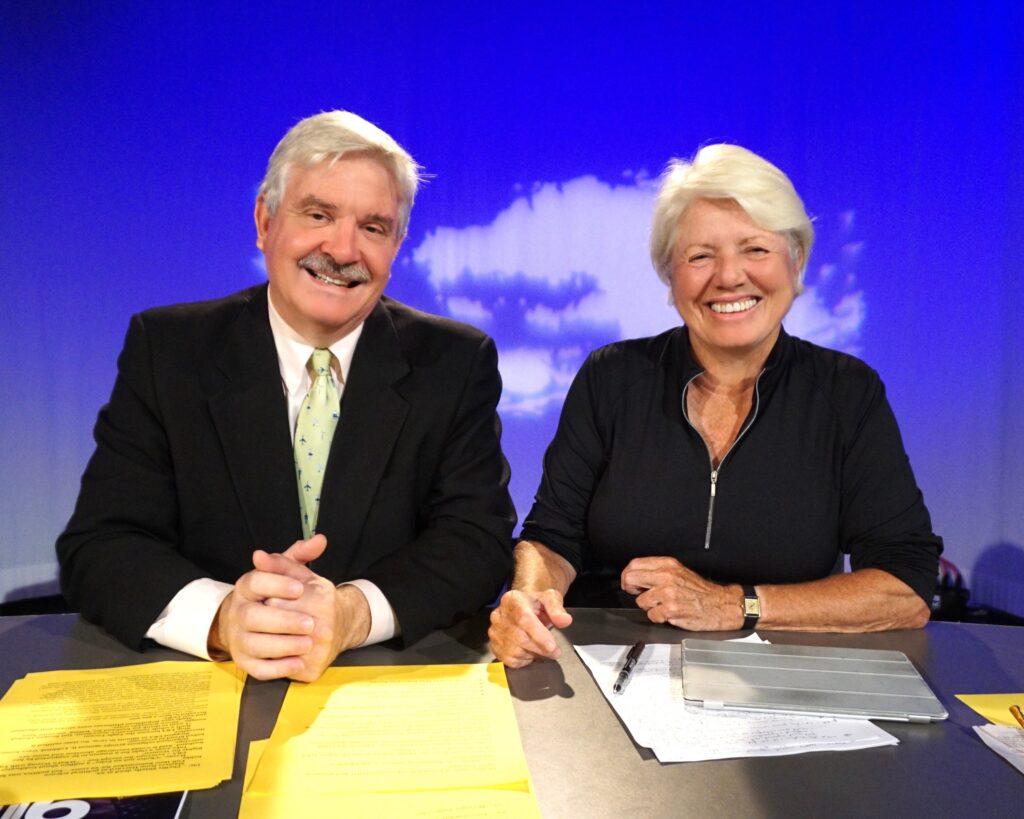Gay USA is the TV show for our times
Tune in to Andy Humm and Ann Northrop — and their history of LGBTQ activism.
Where do you get your gay news? The objective reality of the mainstream has been shaped in no small part by generations of news anchors on major TV networks presenting current affairs. What about our community? Who delivers the breaking news and analysis for us?
Meet Andy Humm and Ann Northrop: seasoned and passionate activists with decades of community service under their belts. Together, they’ve hosted Gay USA since 1996, although the show ran for a decade prior to this dynamic duo teaming up.
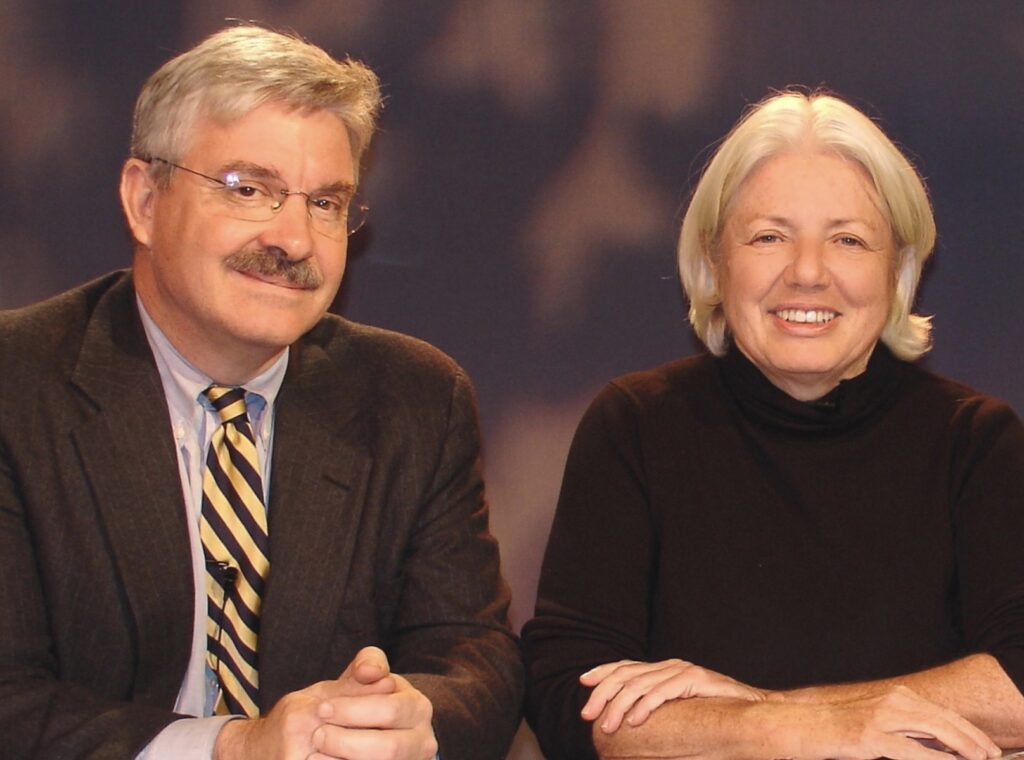
Not only has the show, which is broadcast from Manhattan each Wednesday, feature Ann and Andy in conversation — it has invited guests who comprise the best in LGBTQIA arts and activism: Gloria Steinem, Paula Vogel, Lesley Gore, Alan Hollinghurst, Edward Albee, Urvashi Vaid, Kate Bornstein, Michael Musto, Ann Bannon, Christine Quinn, Kate Clinton, Peter Tatchell, Dee Rees, Kate Kendall, Edie Windsor, Edafe Okporo, just to name a very few.
I was lucky enough to sit in on the show as a guest host and I know firsthand the amount of dedication that goes into each episode. Gay USA is more than TV. It is our history. So who better to invite onto the Queer Forty cover after the arduous election period than Andy and Ann? Here is our conversation:
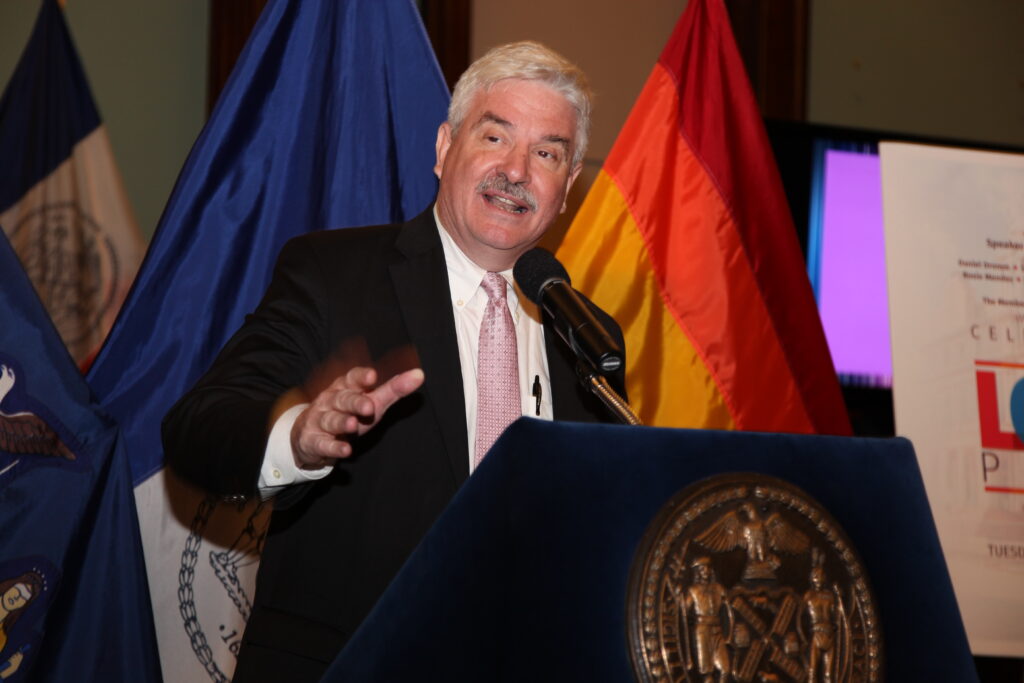
When and where did you two meet?
Andy: I had just been hired as Hetrick-Martin’s first director of education on an AIDS grant from the City to train young people and youth-service providers on AIDS and LGBT issues. We had slots for two more staff in the department. Ann, coming to us from network TV, was a stellar educator and activist. She and I and the rest of educators were out in the schools all day long working to lessen homophobia, de-isolate LGBT youth, and give frank, life-saving information on HIV and how to avoid it, including how to use condoms and dental dams properly.
Ann: I’d been working in mainstream news since I got out of college in 1970. But by 1987, working as a writer-producer at the CBS Morning News, I was fed up with the stupidity and emptiness, so I quit. After several months of my thinking and searching, a friend suggested I talk to the team at the Hetrick-Martin Institute. When HMI offered me a job advocating for HIV/AIDS education to young people, I grabbed it.
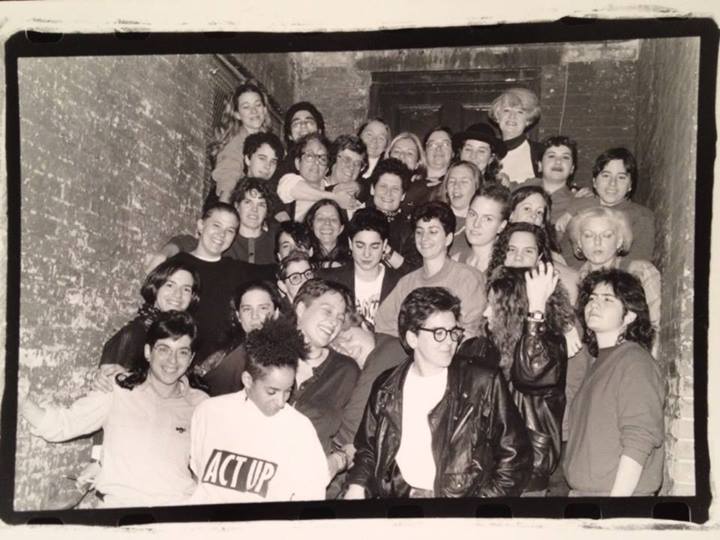
Andy, you were at Gay USA from 1985, how was it that Ann came on board?
Andy: When I started at the Gay Cable Network in ’85, I just did a weekly commentary. But that evolved into helping producer Lou Maletta cover the news in the field and analyze the news in studio pieces, often with panels of activists. Eventually I was doing a summary of the news on “Pride and Progress” which became “Gay USA” with Lee Sharmat who also covered events and was the GCN sports reporter. When Lee departed on February 6, 1996 there was only one lesbian journalist I could think of who I could think of who had the chops to co-host. And the rest is herstory.
Ann: Andy and I had worked together for 4 years at HMI before I left to take on other challenges, but we crossed paths a lot in the intervening years. I’d gone on to lots of activism and work with community orgs. Then he called me up one day at the beginning of 1996 and asked whether I’d like to co-host Gay USA with him. It seemed like a very natural move. But I had no idea I’d be doing this for 25 years.
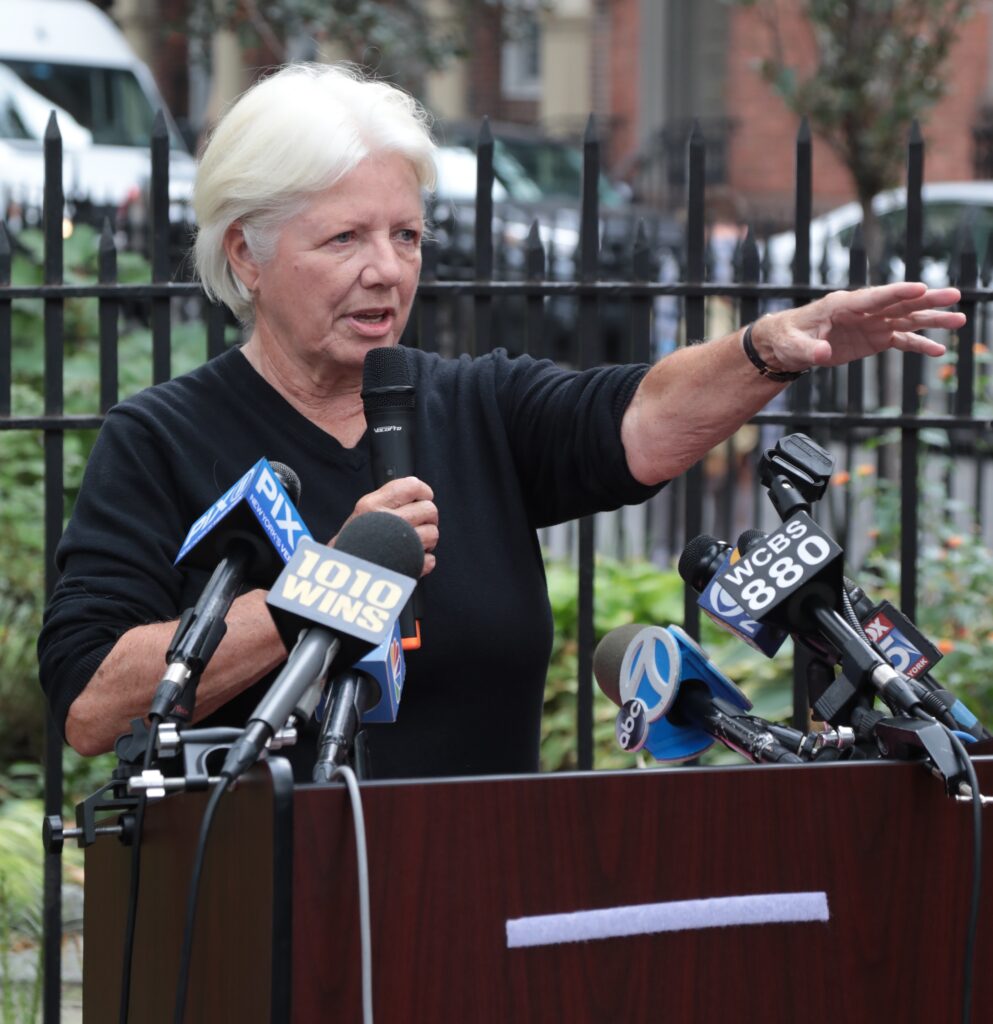
It’s a great match! What contributes to your onscreen chemistry?
Ann: I think we’re a lot alike in our interest in news and social justice and our eagerness to talk about what’s going on in the world. I think we’re both interested in what the other has to say and we both grew up in fairly big families where there was a lot of conversation (for better or worse) about politics and issues. And after 25 years on air, and years of working together before that, chemistry is almost inevitable. Raggedy Ann and Andy. I tell people that Andy is my New York brother (I grew up with 4 brothers).
Andy: Ann is dedicated to mastering the stories that she conveys and is skilled in telling the stories in a coherent fashion that works for television. She’s a great conversationalist. She also has a long historic relationship with all the issues that we’re talking about that adds depth and context. Chemistry? It’s mutual respect.
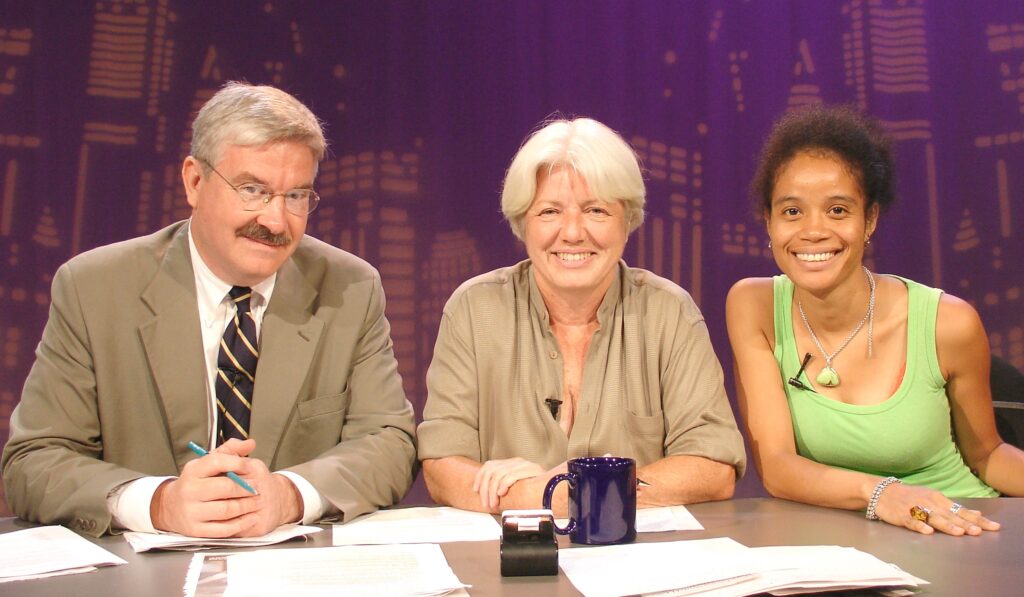
You have been co-hosts since 1996. What are your memories of that year in particular?
Andy: Our first guest was Carlos Cordero, a PWA artist with Visual AIDS in the first year that drug cocktails had become an effective treatment for HIV. We covered the ongoing controversy over the inclusion of LGBT Irish in the St. Patrick’s Day Parade. We weathered a death threat together that year. 1996 was the year South Africa was the first country to protect sexual orientation in its constitution. We got a win in the US Supreme Court when Justice Anthony Kennedy wrote the decision in Romer v. Evans, stopping Colorado from banning LGBT rights. But it was also the year Congress reacted to the “threat” of same-sex marriage by passing the Defense of Marriage Act by a 5-to-1 margin. President Clinton signed it, banning the federal government from recognizing same-sex marriages and allowing the states not to recognize legal same-sex marriages in other states. The Second Circuit appeals court upheld “Don’t Ask, Don’t Tell” in ’96 after it had been struck down by a lower court.
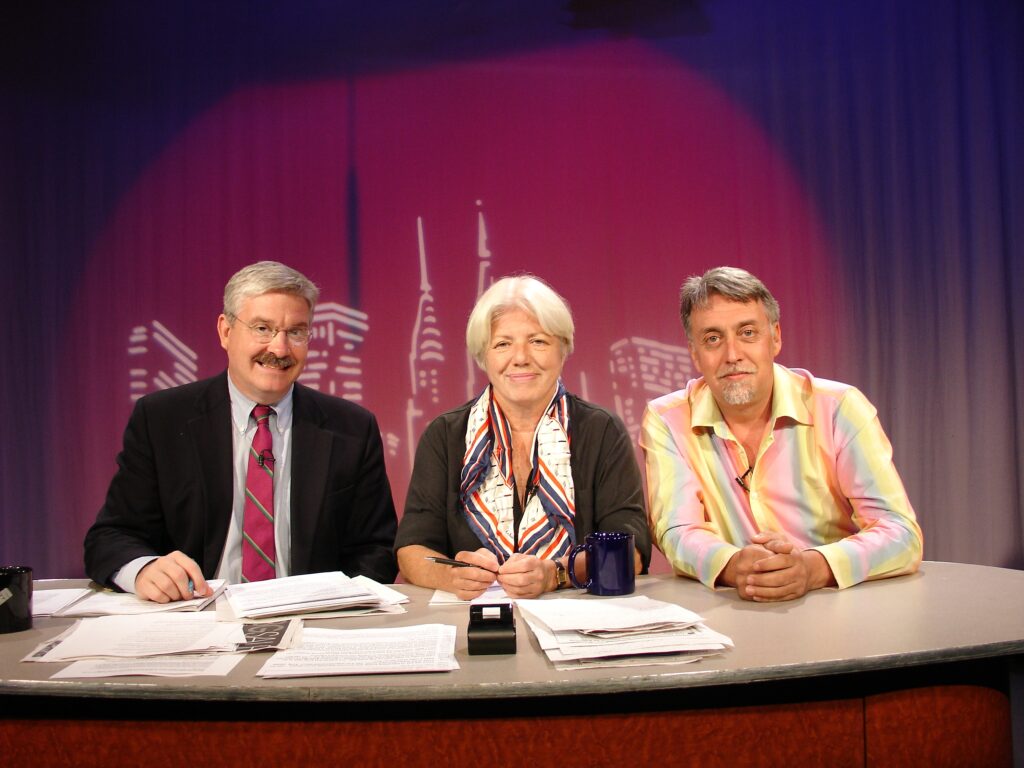
Ann: Andy’s got a good list but for me, it’s all about DOMA and the Republican and Democratic conventions. Andy stayed in New York but I went to San Diego and Chicago with a crew. My main aim was to ask every Senator I could ambush how they were going to vote on DOMA a few weeks later. I had riveting conversations (good and bad) with several of them. I also directly confronted a couple of closeted Congressmen (Mark Foley, for one), had a toe-to-toe name-calling argument with Dick Armey, and sat down with Strom Thurmond, who told me he supported needle exchange. Many other memories from those trips. Definitely a career and life highlight.
2021 will mark 25 years presenting the show. Those years span some milestones in the struggle for equal rights for our community. What were your personal watershed moments?
Ann: The major court cases stand out to me. In years when we felt despised and oppressed, every win in court felt emotional, affirming and deeply moving. Just reading judges’ opinions in our favor could move you to tears. At the other end of the power spectrum, I’ve always been moved by the courage of individual grassroots activists, especially those in the most dangerous places around the world. I will never forget the pictures of a little Pride Parade by Ugandan refugees in an Ethiopian internment camp, waving small rainbow flags.
Andy: DOMA put us back on our heels as state after state banned same-sex marriage—often in their constitutions. Ann always said it was unconstitutional but it wasn’t struck down until 2013 (Windsor) and 2015 (Obergefell) and with the Trump judges it could be reinstated along with the anti-sodomy laws that the high court finally got rid of in 2003. The biggest ongoing issues have been the growing number of out LGBT people in elective office and in every field imaginable; the fights within religious denominations over whether to affirm their LGBT adherents; the bravery of LGBTs coming out in reactionary parts of the country and the world; the integration of LGBT themes into theatre, movies, and TV; the increasing power of the religious right in politics here and abroad; the explosion of news around transgender issues—both trans people coming out and trans women of color especially being murdered; court victories and setbacks; and just the blossoming of LGBTQ activists in towns small and large.
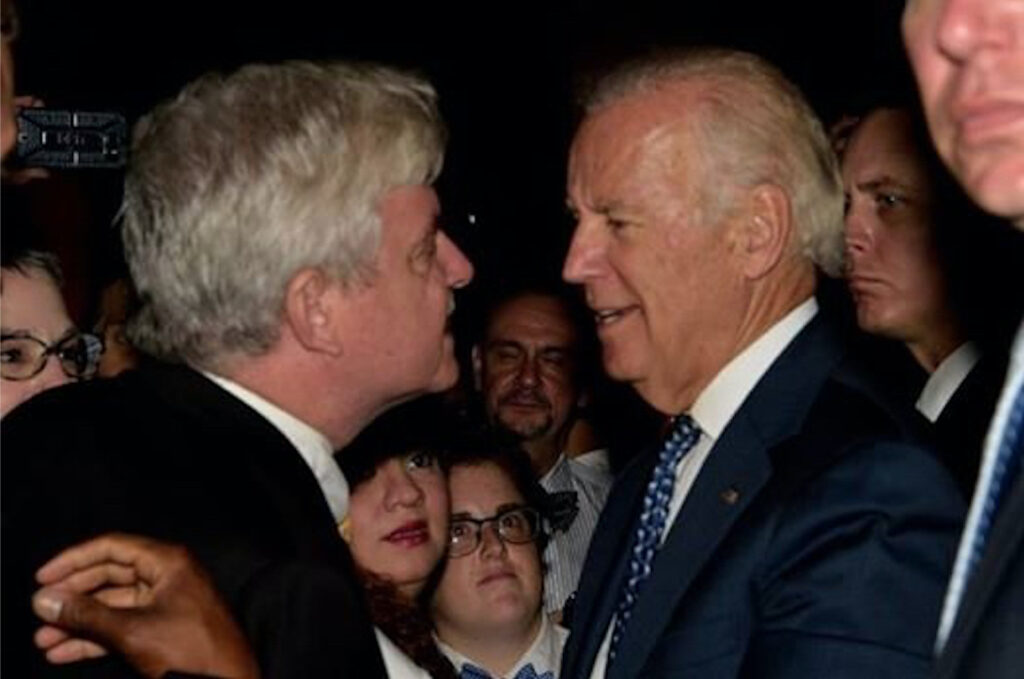
Was there ever a time when current events were so challenging or frightening that it was difficult to deliver the news?
Andy: When Trump won in 2016, we had to do a show the very next day and it was difficult to speak. We had all been gut punched and completely shocked—though Ann was one of the few who predicted that his election could happen and we needed to brace ourselves. We gathered a diverse panel of community members and talked it through, which was helpful to us and our viewers. (I nevertheless went to the ER with the chest pains I was having to get checked out. I was OK. Just stressed because I knew all of the horrible things that were going to happen and they have.)
It’s always hard to talk about bad news — trans women murdered, HIV+ people criminalized and jailed, vicious government crackdowns, LGBTQ people fired, spat upon, treated as less than human. But I’m a great believer in the intelligence and resilience of our communities, so while I mourn the tragedies that befall us, I am ultimately an optimist who thinks we’ll prevail.
Ann Northrop
Gay USA caters to people over forty, many of whom have been activists like yourself. Do you worry about the future of activism in our community?
Andy: We’re way over forty but we hear from viewers of all ages, backgrounds, and sexual orientations and gender identities. We hear from young people who were aided in their coming out process by the show—and many people who took up activism in their communities because they were inspired by the show. No worries about the future of the movement—as long as people understand that everything we’ve achieved can be taken away if we don’t continue to press forward.
Ann: I always worry about the future of activism for the LGBTQ communities and the whole world. The forces of authoritarianism and the urge to gain and maintain power are enormous. The people have to remain eternally vigilant and constantly active to repel those forces, so we desperately need activism of all sorts. But I agree with Andy that we are trying to educate and inspire all people of all ages everywhere.
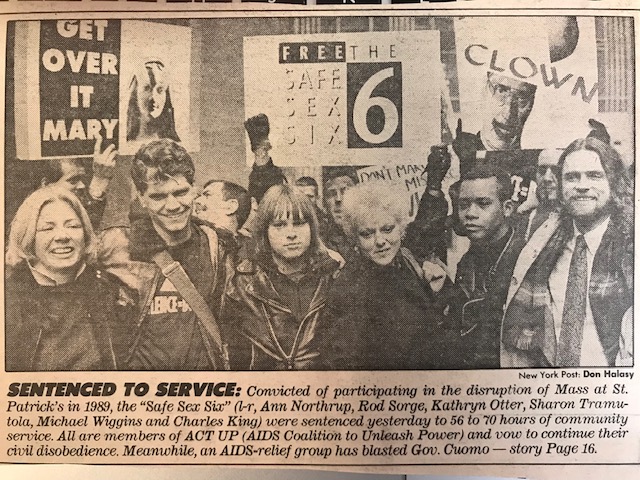
What is the best thing about getting older as an LGBTQ person? What is the worst thing?
Andy: There’s a certain amount of freedom that comes with age—accepting that there are plenty of younger people taking up work in the movement that when I was most active in my prime I sometimes felt couldn’t do without me (when, of course, it can and does). The worst thing is having less energy, but I’m learning to pace myself. I’ve retired from playing the fool, too. I had great times with the different men I was with over the years and they are all still good friends. But I’m happy living alone—which makes surviving this pandemic easier than it might have been.
Ann: We are very lucky, privileged people who have had the joy of long lives in the LGBTQ community. We’ve been involved on the front lines and we’ve known and worked with a wide range of wonderful people. Having the satisfaction of having done that work makes for a contented older age. But the worst thing? Getting old! Knowing you can’t last forever! Worrying that the U.S. and the whole world are teetering on the brink! And then there are all the younger people who are ignorant of history. Very sad.
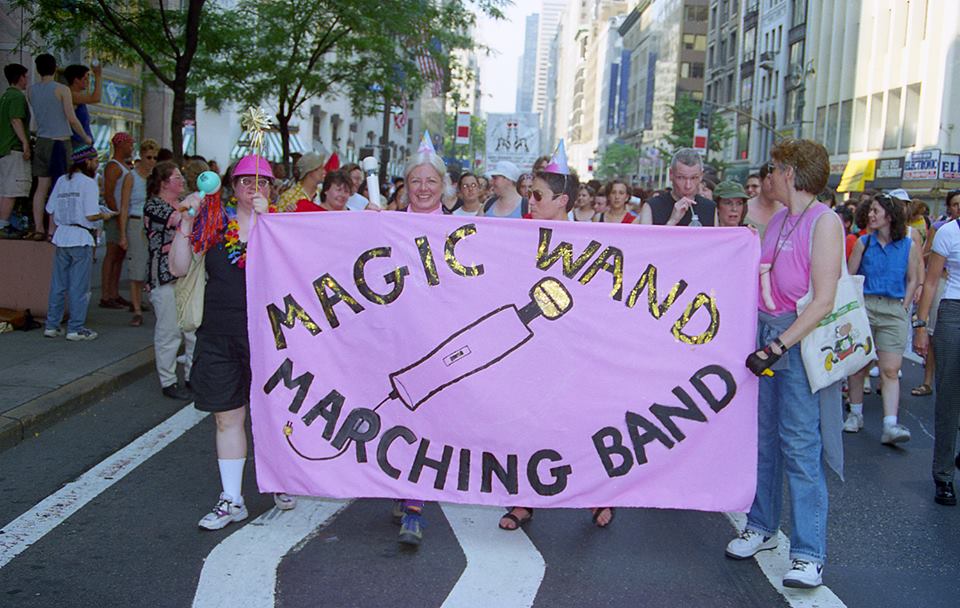
The election results are a relief. What do you see as the ongoing issues and challenges our community faces in the next few years?
Ann: The list is too long.
Andy: The elections showed that there is a pretty hard-core reactionary core in this country. We are up against deeply undemocratic systems of governance at the state and federal levels that have stopped government from reflecting the fact that most people support basic LGBT rights, including marriage equality. Transgender people face higher obstacles of prejudice and violence that are going to require stepped up investment in housing, employment, and education for them and sensitizing the general population. Our biggest political fight is against the destruction of the wall between church and state as “religious freedom” becomes a license to discriminate against LGBT people and religious minorities.
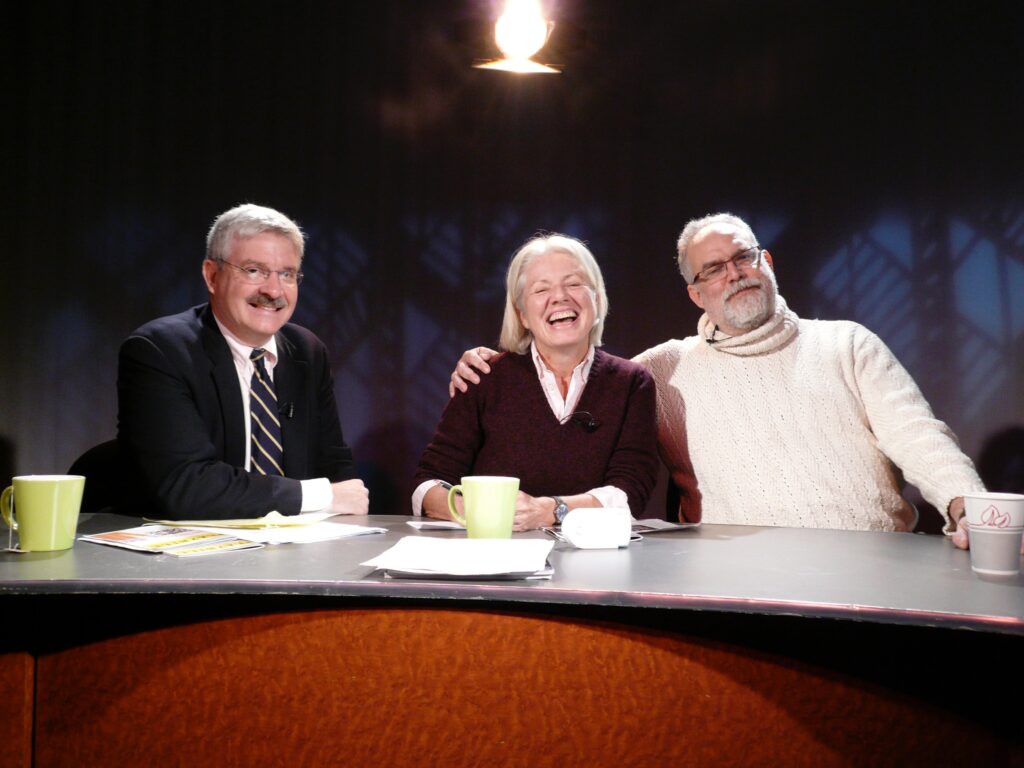
What does Gay USA need from us right now?
Andy: We appreciate all the support we get from the community — donations, unsolicited lovely messages about how much the show means to people, and plenty of news tips as well. (We appreciate the corrections and disagreements, too.) Our audience keeps us going.
Ann: We need everyone to be engaged in the betterment of the world, so we can retire.
Gay USA airs on Wednesdays. Watch the latest episode at gayusatv.org.
